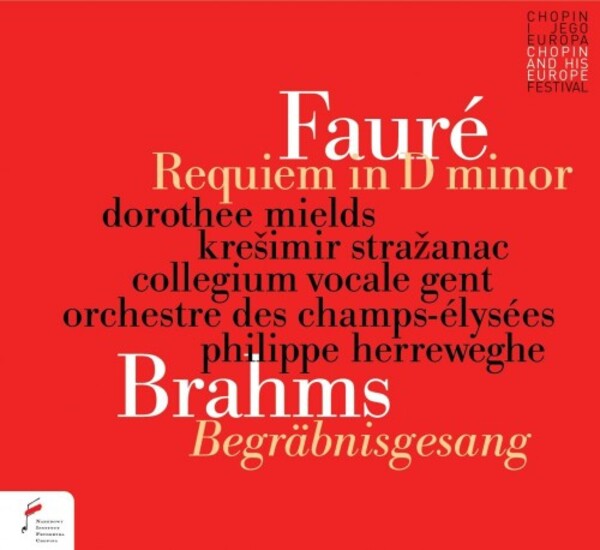
Faure - Requiem; Brahms - Begrabnisgesang
£13.25
In stock - available for despatch within 1 working day
Despatch Information
This despatch estimate is based on information from both our own stock and the UK supplier's stock.
If ordering multiple items, we will aim to send everything together so the longest despatch estimate will apply to the complete order.
If you would rather receive certain items more quickly, please place them on a separate order.
If any unexpected delays occur, we will keep you informed of progress via email and not allow other items on the order to be held up.
If you would prefer to receive everything together regardless of any delay, please let us know via email.
Pre-orders will be despatched as close as possible to the release date.
Label: NIFC (National Institute Frederick Chopin)
Cat No: NIFCCD151
Format: CD
Number of Discs: 1
Genre: Vocal/Choral
Release Date: 26th April 2024
Contents
Artists
Dorothee Mields (soprano)Kresimir Strazanac (bass-baritone)
Collegium Vocale Gent
Orchestre des Champs-Elysees
Conductor
Philippe HerrewegheWorks
Begrabnisgesang, op.13Requiem, op.48
Artists
Dorothee Mields (soprano)Kresimir Strazanac (bass-baritone)
Collegium Vocale Gent
Orchestre des Champs-Elysees
Conductor
Philippe HerrewegheAbout
The latest redaction of the score dates from 1900 (with corrections made in 1901). The new approach to the Requiem tradition is evidenced by the opening Introit from the Kyrie - scored for chamber forces, with a calm, contemplative chorus, without a shadow of drama. The ensuing Offertory, originally conceived for solo voices and only using the choir in later versions (from the choral 'Domine Jesu Christe' to the baritone 'Hostias'), with its opening canon consolidates the mood of reflection, which is retained in the polyphonic choral Sanctus, based on a simple three-note melody. A climax of sorts is provided by what is perhaps the most famous episode in the work: the soprano 'Pie Jesu'. Close analysis of the form of this work betrays startling similarities to Johannes Brahms's Ein deutsches Requiem.
Brahms's Begrabnisgesang [Burial song], op.13, is the first work in which the composer combined a choir with instruments: twelve winds and timpani. It is highly likely that the idea for this composition is linked to the development of his Ein deutsches Requiem, already maturing at this time, although not fully realised until ten years later. Such is suggested by the forces, the subject matter and also the concept for a grand oratorio making use of what Brahms considered to be the most valuable ideas from his earlier works. The direct impulse for the composing of this youthful masterwork was no doubt the recent death (in 1856) of Brahms's master and friend Robert Schumann.
This disc was recorded live at the 17th International Music Festival 'Chopin and his Europe' at the 'Teatr Wielki' Polish National Opera in Warsaw, Moniuszko Auditorium, on 31 August 2021.
Error on this page? Let us know here
Need more information on this product? Click here